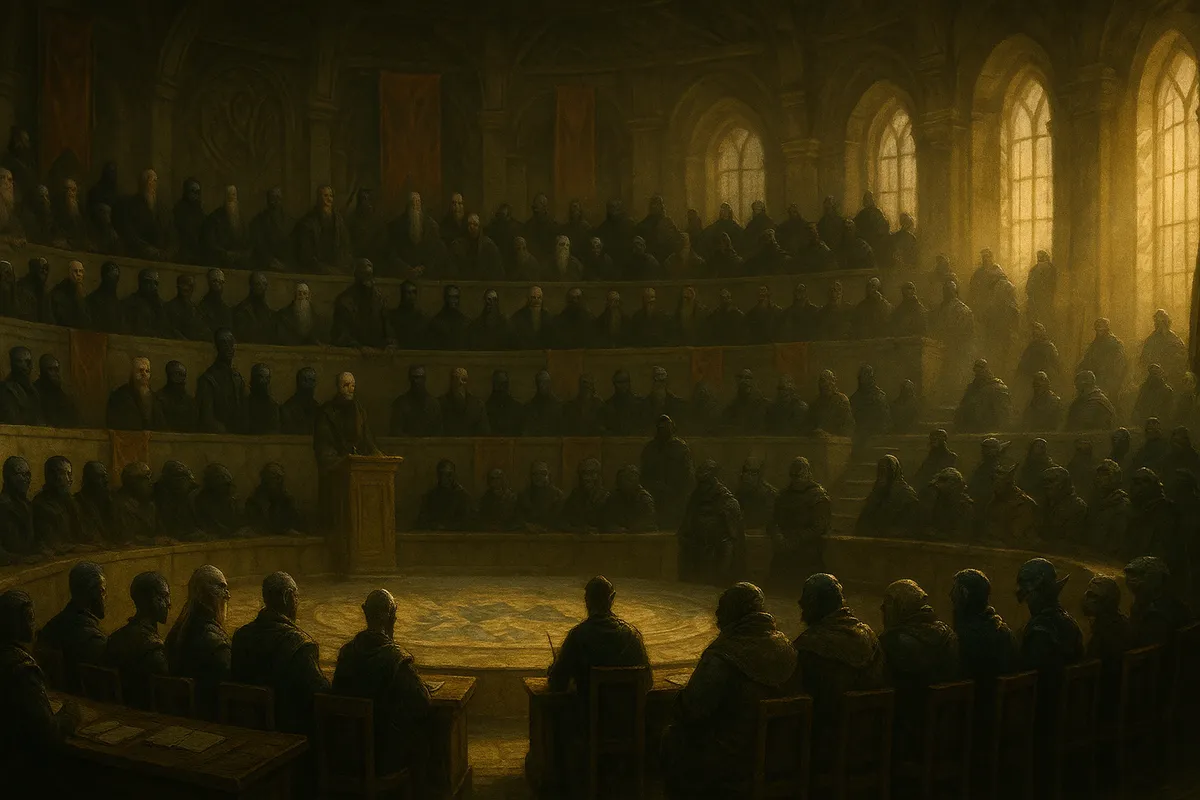On Loria Broadly:
The Dominion

Power in Loria does not move cleanly from throne to subject, nor flow like water down the easiest paths. It coils. It barters. It whispers in corners. The land is divided into great countries, each tethered to dynasties that stretch back so far they feel more like seasons than rulers. Some call themselves monarchs, others stewards, others still hide behind councils of “elected” lords — but in truth, blood and wealth remain the marrow of rule.
The Houses sit highest in this structure, each presiding over its own territories, mines, fields, and courts. Their banners mark borders more sharply than rivers or mountains do. A few lesser nobles — barons, castellars, viscounts, whatever names their lands choose — administer what remains. And beneath them, the bulk of Loria bends back and forth with the weight of whoever claims dominion.
The Sundering War
No account of the Dominion can be told without the scar of the Sundering. For fifty years, neighbors carved each other down, generations born into siege and slaughter. The war ended only two decades past, and still its smoke clings to the bones of Loria.
Ask a dozen people its cause, and you’ll receive a dozen answers: insulted honor, stolen mines, a noble child murdered in secret, heretical rites whispered in caverns. In truth, the Sundering became all of these and more. Espionage and lies fed the fires until no hand was clean. By the end, entire Houses were broken, their names erased or mocked as curses.
Though treaties have stilled the swords, the bitterness has not cooled. Many still hunger for redress, and others can only mutter prayers that their children will not inherit the same grief.
The Convocation
Once each year, all Houses — mighty and middling alike — are bound by oath to gather. This meeting, called the Convocation, is held most often in Tolmir or another city of the Valemire, where the forests and swamps serve as neutral ground.
It is a theater of diplomacy. Ambassadors bow, emissaries drink, spies slip through the crowds, and oaths are signed as easily as they are broken. Officially, the Convocation exists to preserve peace. In practice, it is a stage where grudges sharpen and alliances take root. Still, without it, the Sundering might never have ended at all.
Law and Its Shadows
Every country of Loria maintains its courts, its tribunals, its laws carved into stone. Yet law here bends like wet wood. A commoner may find justice swift if their accuser is poor, or endlessly delayed if the accused is noble. Judges and advocates wear fine robes, but the coin purse speaks louder than parchment.
Some regions cling to old honor courts, trial by duel or ordeal. Others have adopted inquisitorial councils: black-robed figures whose questions cut sharper than any blade. In truth, neither method ensures fairness. Both merely remind the folk that power rarely sits in their hands.
The Arm of the Houses
Behind the courts stand the swords. Each House fields its own armies — drilled soldiers, mercenary banners, peasant levies drawn when need arises. Some deploy wandering agents, knight-errants sworn to root out banditry or dissent. Others rely on their inquisitors, feared as much as revered, who serve as judge, spy, and executioner all at once.
Ranks and titles shift between countries, but the pattern is the same: a pyramid built of blood. At its base stand countless farmers and laborers pressed into service when called. At its heights, a few cloaked figures whisper commands that can reshape the fate of thousands.
The Dominion’s Fragile Balance
So the Dominion persists — not as a single empire, nor as a federation of equals, but as a knot of Houses whose rivalries and oaths weave together a fabric that somehow holds. The common folk live in the gaps, often safer now than in the years of war, yet always aware that they are the ground on which their betters play their games.
Temples and cults entangle themselves with politics, for no House can entirely escape the pull of the deities. Some courts are lit by Orviel’s moss, others swear to Calveth’s forge, still others hedge their bets with offerings to several at once. Faith is both weapon and shield, a means of claiming legitimacy as much as a plea for divine favor.
What stability exists is fragile, and everyone knows it. The Sundering ended, but mistrust lingers. The Convocation binds, but it also tempts betrayal. The courts pronounce justice, but gold redefines guilt. And always, in the quiet places between cities and strongholds, whispers tell of secrets kept hidden: ancient relics, the deep rooms of the Labyrinth, forgotten rites, and truths older than the Dominion itself.
For now, the Houses play their long game. But history in Loria has shown that games of power rarely end. They only change hands.